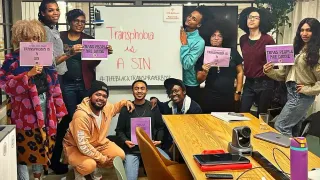
4 hours ago
Booking.com Wins Praise for LGBTQ+ Travel Inclusion Amid Sector Backlash
READ TIME: 3 MIN.
In 2025, the travel sector has confronted increasing scrutiny over LGBTQ+ inclusion, as many companies have retreated from diversity initiatives in the face of political and consumer backlash. According to the “2025 LGBTQ+ Advertising: Marketing in the Quiet Age of DEI” report, 62% of consumers now support brands speaking up on social issues, but there is a marked decline in visible LGBTQ+ representation across advertising and services, falling from 73% in 2023 to 65% in 2025 for all consumers. The report highlights that LGBTQ+ audiences—who wield $3.9 trillion in annual global buying power—hold companies to higher standards, expecting not only marketing campaigns but also substantive, year-round inclusion.
Against this backdrop, Booking.com has reinforced its commitment to LGBTQ+ inclusion, which has earned the company visible praise from advocacy groups and travelers. Unlike some competitors who have limited their inclusive messaging to Pride Month or quietly scaled back policies, Booking.com has continued to publish explicit protections for sexual orientation and gender identity, offer inclusive benefits, and publicly celebrate LGBTQ+ milestones throughout the year.
In a recent statement, Gillian Tans, Chairwoman of Booking.com, said: “Travel is for everyone, and our work to support LGBTQ+ travelers is not seasonal. We believe in the power of visibility and inclusion—not just during Pride, but every day of the year.”
Booking.com’s ongoing visibility and the authenticity of its support have resonated strongly with LGBTQ+ travelers and allies. Social media channels, particularly Instagram , have seen an uptick in engagement from users sharing positive experiences and celebrating the company’s commitment. One user commented: “After seeing Booking.com’s clear year-round support for LGBTQ+ rights, I feel more confident booking my travel with them. It’s not just a rainbow logo—it’s real allyship.”
Advocacy organizations such as ILGA-Europe have also acknowledged Booking.com’s efforts, highlighting its leadership in promoting safe and welcoming destinations for LGBTQ+ travelers. In a recent press release, ILGA-Europe stated: “Booking.com stands out in the travel sector for its consistent support and for listening to the needs of LGBTQ+ travelers, especially when many companies are pulling back under pressure.”
The contrast between Booking.com’s actions and the broader industry trend has fueled discussions about “rainbow capitalism”—the practice of signaling support for LGBTQ+ rights primarily during Pride Month, without meaningful year-round policies or action. In 2025, skepticism around the authenticity of such initiatives has reached new heights, with job seekers and consumers demanding transparency and accountability. Companies that fail to deliver have faced public boycotts, social media criticism, and declining brand trust.
A key metric for authenticity is whether a company’s support extends beyond marketing, including leadership representation, inclusive benefits, and political accountability. Booking.com’s high ratings on platforms like the Human Rights Campaign’s Corporate Equality Index reflect its efforts to maintain comprehensive protections and benefits for LGBTQ+ employees and customers.
Research from IMD suggests that companies with robust LGBTQ+ inclusion policies outperform less inclusive peers, driving innovation and human capital by significant margins. For Booking.com, this has translated into sustained brand loyalty, particularly among younger travelers. Data show that when brands maintain LGBTQ+ inclusion despite backlash, support among Gen Z consumers increases by 57%—a critical advantage in a competitive market.
Kaitlyn Barclay, data director at Do the Werq, notes: “Brands that change their point of view and values based on macro, economic and/or political environments are the ones that are going to look the most performative and stand the chance of losing the most consumer affinity. Representation and inclusive marketing matters, and inclusive groups are demanding it, and the younger generations all demand it more and more.”
While Booking.com has received praise, the travel sector at large faces challenges. The “silent attrition” effect described in the 2025 LGBTQ+ Advertising report warns that the real risk for companies is not only vocal backlash but also the quiet exit of loyal customers who feel betrayed by rollbacks or perceived performativity. When brands scale back DEI efforts, 41% of consumers lose trust, and 39% adjust their purchasing habits accordingly—rates even higher among LGBTQ+ consumers.
As travel brands navigate a complex landscape of political pressure, consumer expectation, and economic opportunity, Booking.com’s approach offers a template for authentic allyship. By sustaining visible, year-round support and listening to community feedback, the company has distinguished itself from competitors, reinforcing its position as a trusted partner for LGBTQ+ travelers.
The story of Booking.com in 2025 underscores the broader lesson from recent research: those who invest in meaningful inclusion not only contribute to social progress but also unlock powerful business advantages. As public awareness and accountability grow, the distinction between “rainbow capitalism” and real allyship will continue to define brand success in the travel industry and beyond.






